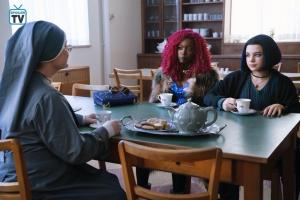In the Pilot episode of DC Universe’s Titans (reviewed here), we meet a familiar character (Robin) and several new heroes (Rachel, Kory, and a tiger/boy). In the second episode whether they are exactly heroes is brought into question, given their actions. (You can read my thoughts on that here.) The title of the third episode, “Origins”, would seem to promise us some backstory, finally.
And yet, that’s not what we really get in this episode. In the last episode, Dick, Hank, and Dawn were all knocked around by the family sent to kidnap Rachel. At the beginning of this episode, Rachel is rescued from the family by Kory, who kills the father of the family in the process. Kory and Rachel then make their way to the convent where Rachel was raised. On their way there, they meet “Gar”, the shape-shifter (?) we briefly encountered in the first episode. Dick catches up to them, experiencing a series of flashbacks to his adoption by Bruce Wayne along the way. (We also see a bit more about where the family comes from, and the attitudes of whoever it is that gives them orders.)
Most people familiar with the Batman story will know the details of Dick Grayson’s origins. Dick’s parents were acrobats who were murdered because the circus wouldn’t pay protection money to the mob (or some variation thereon). Bruce Wayne was there at the time, and adopted Dick and taught him to channel his anger towards justice rather than vengeance. We’re obviously being set up for some kind of later trauma that separates Dick from Bruce, given Dick’s violent tendencies and his no longer living in Gotham City or working with Batman.
We also see the orphanage/convent where Rachel was raised, and get a bit more of the amnesiac Kory’s backstory. Not much—mostly that she speaks other languages and has been looking for Rachel for a long time. Longer than since the Pilot episode, at any rate. And it turns out that the sweet little-old-lady nuns at the orphanage actually know a bit more about Rachel than they had let on, though we don’t necessarily learn anything new. (We are told that she is somehow a doorway to the end of the world, if she invites “her father” in, but we were told something like that in the Pilot episode.)

There is certainly more explicit religion in this episode than in previous ones. We learn that Kory knows something about apocalyptic literature, and of course we have the requisite the well-intentioned-but-obviously-still-somewhat-sinister nuns.
But I think there’s also some value in reflecting on the importance of the past for the present. We are all of us shaped by our past. All of the characters in this episode reflect that in various ways, and highlight the fact that even if we are ignorant of it, our present is directly determined by our origins. This is certainly true biologically—even adopted children remain subject to the genetics and actions of their biological parents. Ignorance of these conditions in no way negates their influence. But neither does knowing these conditions automatically empower us to accept or overcome them. Dick, Kory, and Rachel are each struggling with the present as a result of the past events and actions of themselves, family, and even strangers (presumably known in Dick’s case, unknown to Rachel and Kory).
The same is true of all of us. The present really isn’t isolated or unique, it is rather directly connected to everything that has come before. And that seems like a blindingly obvious statement when it is written down, but the implications of that statement are resoundingly rejected by the modern world. Try telling someone today, for example, that their identity is not a matter of their here-and-now inclinations but is instead grounded in actions and events—sometimes not even their own actions and events that may not directly have involved them—in the past. The reaction will be dismissal, at best.
The good news is that as Christians, we can have a nuanced view of the past and of its influence on the present. The Bible teaches that all of us are sinful, and that every action we have ever taken and every thought or feeling we have ever had is touched with sin. Not, of course, that we are as sinful as we could be in every instance, just that everything we do is tainted. That is the result both of our own choices and of the choices of those who came before us.
The good news is, we do not have to remain defined by our past—there is another option. Our origins are in sin and as a part of the family of Adam. But also long ago in the past, Jesus Christ lived the perfect life that you and I should have lived, and took the punishment on the cross that our sin deserved. When we repent and believe, our past is forgiven, we are cut off from the family of Adam and grafted into the family of God. We are given a new past that looks back not to the fall in Eden and forward to the coming judgment, but backward to the Cross and to the risen Christ and forward to the coming heavenly city. Our old past remains with us, but no longer defines us. We are now free to live new and holy lives.
We’ll see if Titans has room for such a view. In this gritty and brutal world, I suspect that the best we can hope for is a fuzzy sentimentalism based on, well… I don’t know. We’ve not had anything to hang our hats on yet.
Dr. Coyle Neal is co-host of the City of Man Podcast and an Associate Professor of Political Science at Southwest Baptist University in Bolivar, MO.













